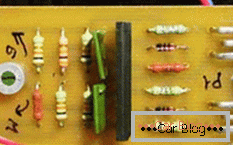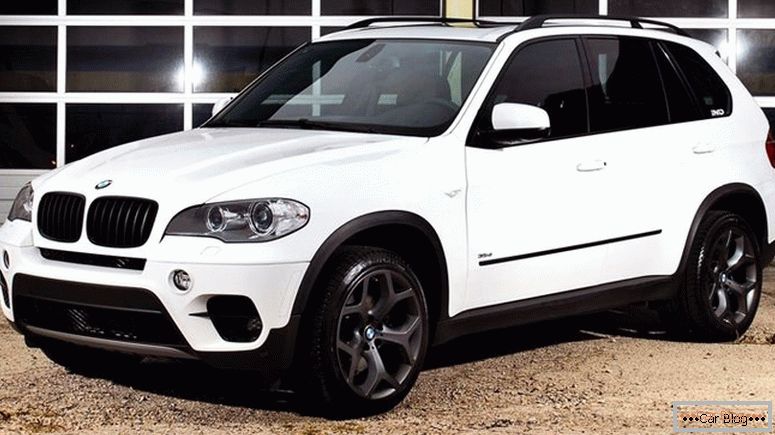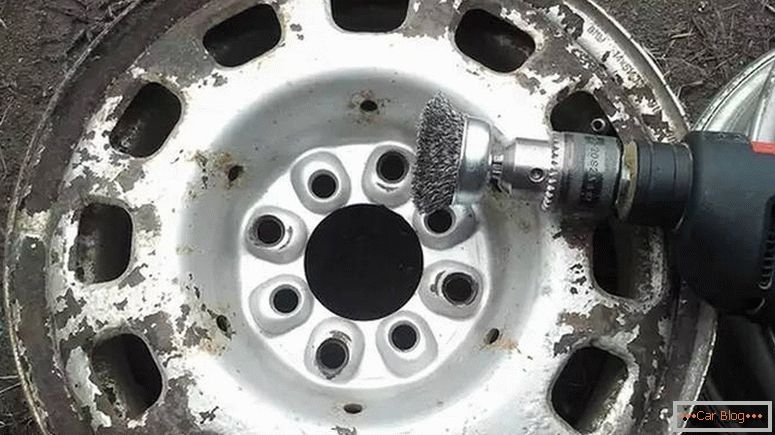>
The brake system is a complex and very important vehicle mechanism in terms of functionality. Its refusal or malfunction can cost the car owner a very expensive, sometimes even life, because to monitor the correct performance of the brakes is the main task of any motorist. In this article we will talk about the need to lubricate calipers and guides, which are an important brake system assembly. Unnatural loud sounds heard from the side of the wheels during braking may indicate the need for lubrication of calipers. These sounds signal that the stopping mechanism works without a lubricating fluid, it can jam at any moment, and accordingly cause a traffic accident with consequences of varying complexity. Let's try to figure out what to lubricate a complex structure, which is better lubricant for guide calipers suitable for difficult situations.
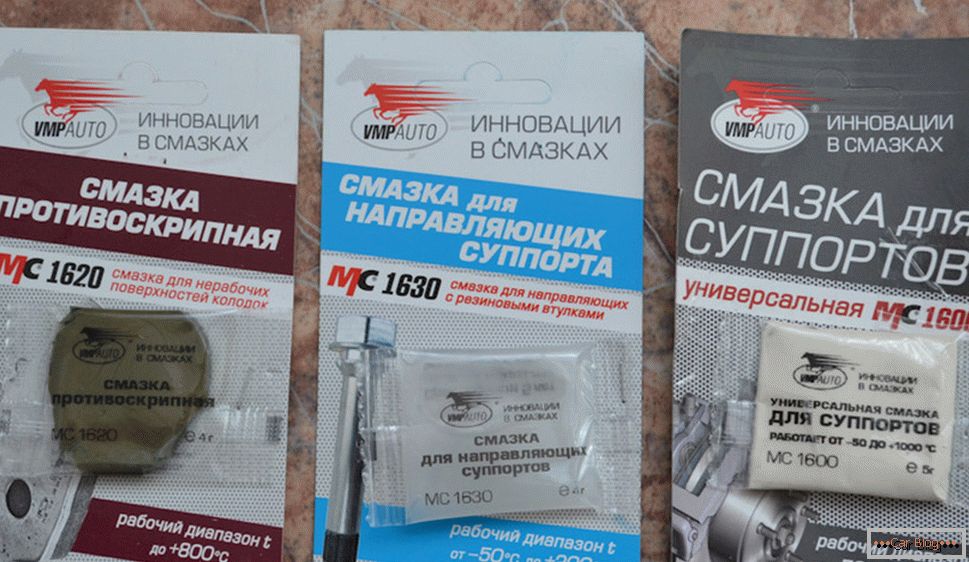
Rating the best lubricants for calipers and guides.
Читать далее про лучшие смазки для суппортов и направляющих-->
Technical features of the functioning of the calipers
The rules for operating calipers and their guides belong to the highest level of complexity. In the mode of emergency braking, movement on difficult sections of the path, the working temperature of the caliper sometimes reaches a limit of six hundred degrees Celsius. Due to heat removal, the process of cooling parts, the temperature can drop to one hundred and eighty degrees, however, even in such conditions, the components of the system need high-quality protection. In addition to the high-temperature mode of operation, the work of calipers is characterized by regular exposure to moisture and water, mud sewage, chemicals, which are processed highway in the winter season. Frequent are the situations of leakage to the brake emulsion calipers, which can occur due to wear of the sealing rings of the piston system.
Impact on the details of a variety of reagents, dirt and high-temperature conditions can negatively affect their functionality, which requires a thorough approach to the processing of structural brake elements. It is important not only to lubricate the system with any lubricant that is available at hand during the next service of the brake system, but also to choose the right lubricant so that it can guarantee maximum protection to the calipers and guides during operation of the vehicle. Consider the types of lubricant products available on sale, with the intended purpose for processing calipers, their features and specifications, try to answer the question, which lubricant for calipers is better positioned in the process of exploitation.
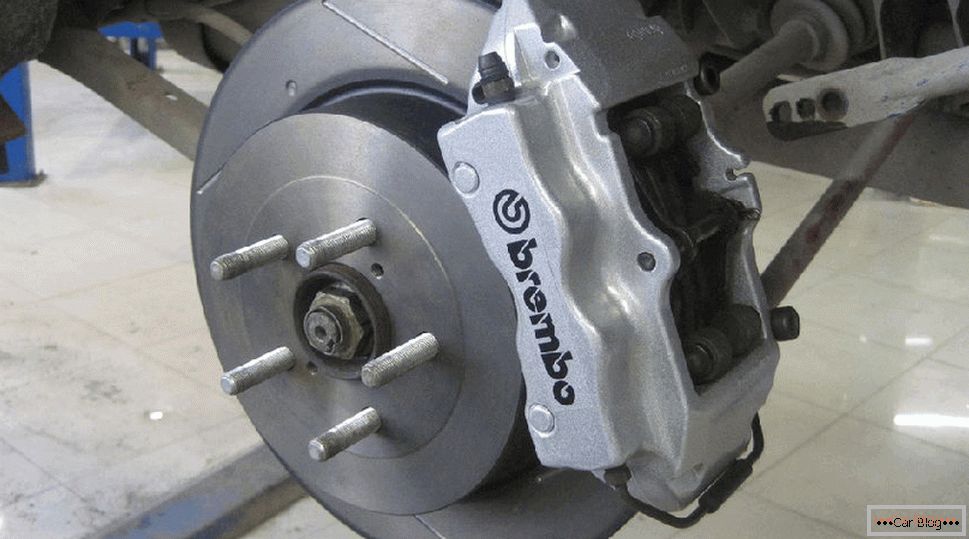
Types of lubricants for calipers
The question is, the better to lubricate the caliper guides, they are relevant only for beginners, but also for experienced drivers. In today's market there is a huge range of lubricants, which differ in composition, characteristic criteria, price and manufacturer. Responsible drivers realize that the “brake system” does not imply economy, since life can depend on it, and not just one, therefore they are wondering how to choose the right lubricant. To choose a lubricant that is good for brake calipers, you first need to examine in detail the types of products available on the market, taking into account their technical characteristics, and only after that give preference to one of the product categories.
The following criteria should be considered when selecting a lubricant:
- resistance to water and aggressive components of chemicals;
- maintaining high-temperature regimes with a starting count of one hundred and eighty degrees and above;
- stability of technical characteristics at extreme subzero temperatures, which is important in winter;
- the absence of components that can have a destructive effect on rubber and plastic components and seals.
The entire range of lubricants is conventionally divided into three categories: emulsions of synthetic or mineral series with the inclusion in the structure of metal-containing components, products based on oils of mineral origin and substances of a synthetic type. Let us consider in detail each of the types of lubricants.
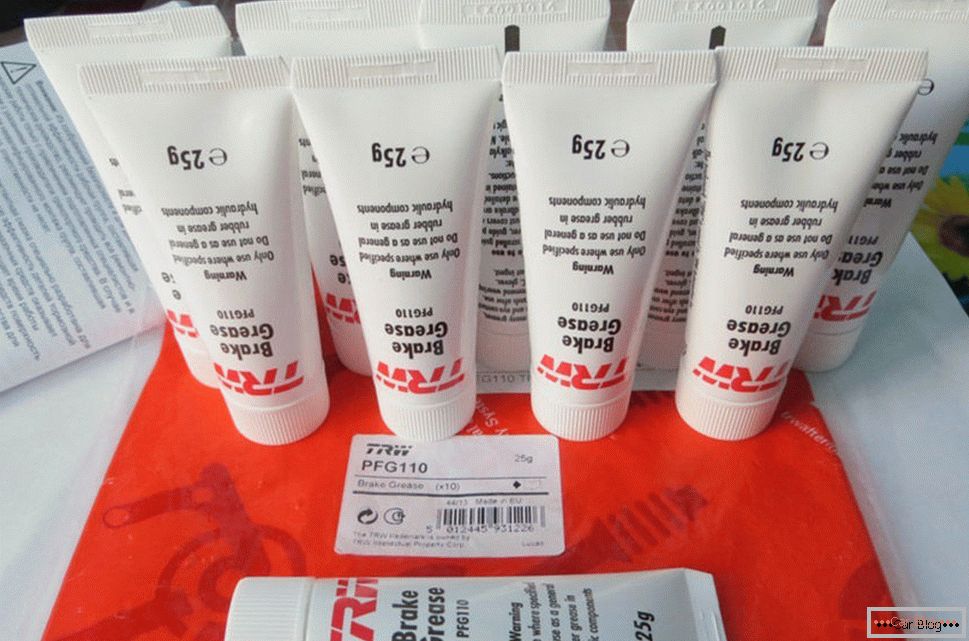
Synthetic or mineral mastic with the inclusion of metal components
This category of lubricant products include materials that have decent anti-seize properties, as well as characterized by a large range of temperature regimes, which indicates the heat resistance of goods. The range of operating temperatures most often indicated by the manufacturer on the product tube can vary from one hundred eighty five degrees with minus to one thousand one hundred degrees with a plus. The basic material of a product is most often a mineral or synthetic category of substances in which metal particles are added. Previously, in the production of these lubricants, manufacturers exclusively used copper or molybdenum to perform protective functions from temperature extremes. At present, the range of such pastes is much more extensive, there are the following subspecies of pastes with metallized components in stock:
- Complex type lubricants. Copper, aluminum or graphite are included in their recipe.
- Copper pastes. Consist of graphite and powdered copper.
- Ceramic substances without metallized inclusions. The mastic complex includes ceramics and magnesium silicate.
- Mastics made on the basis of molybdenum or copper.
If the question of the selection of a lubricant is limited by the dilemma of which lubricant to buy for guide calipers, then pastes in this category are perfectly suitable for use, and they can also be used for processing other surfaces subjected to friction. At the same time, materials of this type categorically do not meet the requirements for operation on the working areas of the pads.
Mineral oil based products
Mastics made on the basis of mineral oils are mainly produced with the addition of bentonite, which acts as a thickener in the emulsion. Most often, products in this category are chosen by car owners who operate the machine in benign conditions and are not committed to high-speed modes. Lubricants in this category are well positioned in normal conditions of use, with temperatures ranging from forty-five to frost and one hundred and eighty degrees Celsius with a plus, characterized by stable technical criteria.
For people who prefer aggressive and active driving style, high-speed driving, and also operate the machine in adverse climatic conditions, this type of lubricant is not suitable. When the temperature in the calipers exceeds one hundred and eighty degrees, the mastic significantly loses its technical properties; For such drivers, the problem of which lubricant for calipers to choose will be solved by the products of the following category based on synthetic components.
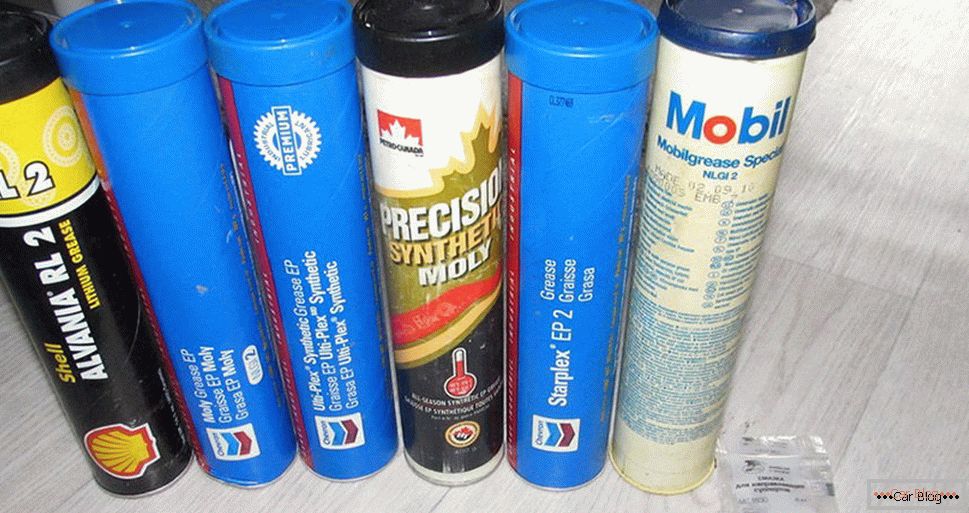
Synthetic oil based lubricants
The most common and functional lubricants are based on synthetic oil. They are ranked as a variety of universal, positioned not only for guide calipers, but also for all system nodes that need to be processed and work in difficult operating conditions. In the manufacture of products used purified synthetic substances, combining a complex of specific additives.  Discounts for new cars! Profitable loan from 9.9% installments 0%
Discounts for new cars! Profitable loan from 9.9% installments 0%  adom.ru, which give anti-corrosion, antioxidant and anti-wear characteristics of mastic. The main priority criteria for pastes in this category, determining the choice of lubricant, manufacturers and experts include:
adom.ru, which give anti-corrosion, antioxidant and anti-wear characteristics of mastic. The main priority criteria for pastes in this category, determining the choice of lubricant, manufacturers and experts include:
- Chemical resistance to alkaline and oxidizing substances.
- Resistance to the effects of brake fluid and water.
- Loyalty to rubber, plastic and elastomer parts.
- Mastic is not subject to evaporation, characterized by dielectric features.
- Scale range of operating temperatures. Lubricants are characterized by technical stability at temperatures ranging from forty degrees of frost to three hundred heat.
- Extensive use: the lubricant is recommended for use on any surfaces operating in friction mode and high pressure.
Most professionals and experts recommend when choosing a lubricant to give preference to synthetic products.
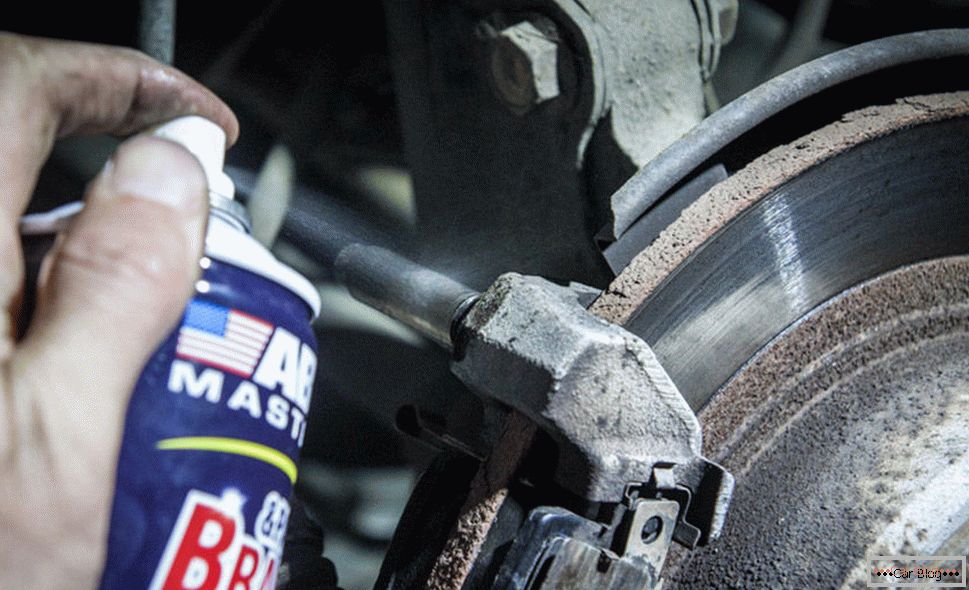
Review of the best lubricants for calipers and guides
The complexity of the selection of lubricants has led to the need to study the key technical criteria and product characteristics for processing brake system components, since the timing and reliability of their service directly depend on this choice. Based on feedback from consumers and service center specialists, a rating of the most popular and effective lubricants, which are recommended for machining guide calipers, was compiled.
In the first place in popularity among Russian customers is mastic MC-1600 from a domestic manufacturer. Paste is ranked as a universal lubricant, operates at temperatures of fifty minus to one thousand plus degrees Celsius. It is recommended by manufacturers for processing the end and non-working areas of the brake system, including those with guide and piston calipers. The main priority criteria for users are called non-stick properties, antioxidant characteristics, loyalty to rubber and rubber parts and bushings. It is perfectly combined with different types of brake fluids, with the exception of DOT 5.0. The cost of a 100 gram tube of paste reaches five hundred rubles, however, it is possible to purchase lubricant in portioned containers of five grams, for one-time processing of parts, costing about seventy rubles.
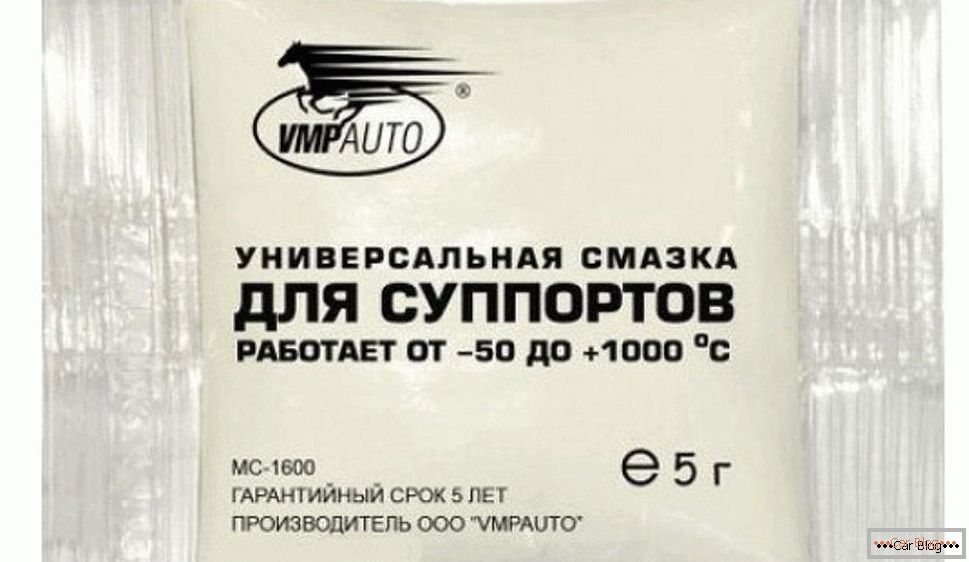
Molykote CU-7439 is included in the rating as the best lubricant for semi-synthetic base slide guides. The paste is characterized by a temperature range from minus thirty to six hundred degrees, increased resistance to pressure, minimal evaporation and anti-corrosion characteristics. Molykote grease is approved for use by many global automakers, which characterizes it from the best side. The cost of stoma capacity is about seven hundred rubles.
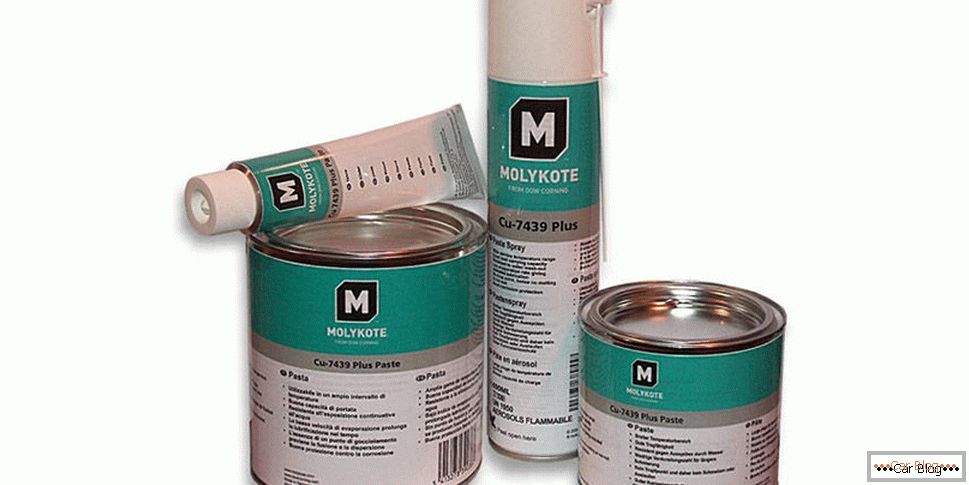
XADO VeryLube in the form of a spray is popular among domestic consumers due to the excellent combination of price and quality. Products are characterized by neutrality to rubber materials, a decent range of operating temperatures, excellent extreme pressure and lubricating properties. The price of a can with a capacity of three hundred and twenty grams is slightly more than three hundred rubles.
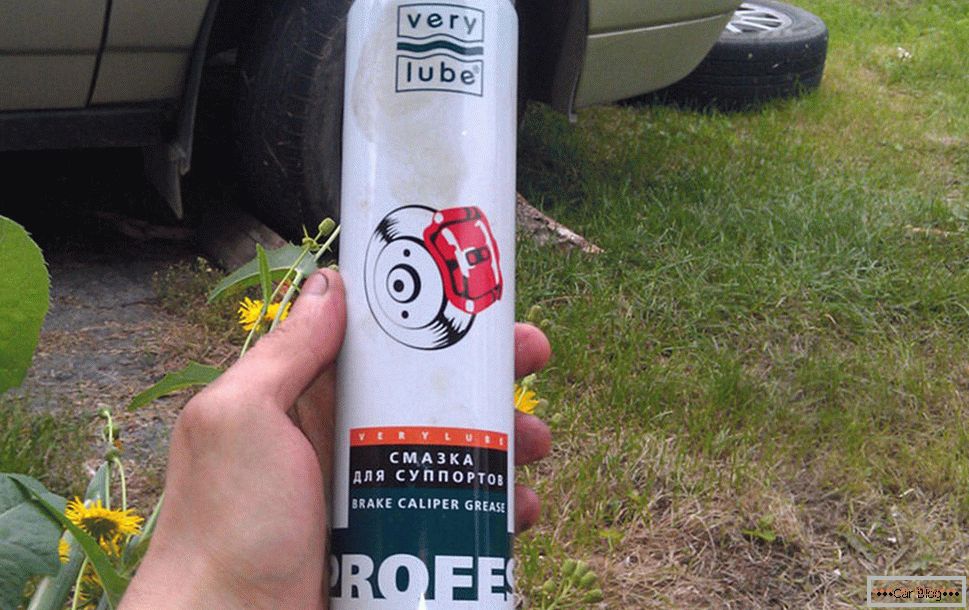
SLIPKOTE 220-R DBC is a silicone-based lubricant, which makes it a universal product. It is characterized by domestic consumers as one of the best mastics for processing guide calipers and other working components of the brake system. Products are characterized by excellent anti-wear properties, anti-corrosion and anti-oxidation properties. Among the shortcomings, consumers note the high cost of goods, which varies within a thousand per unit of goods, the difficulty to obtain products on the Russian market, and use only for disc-type brake systems.
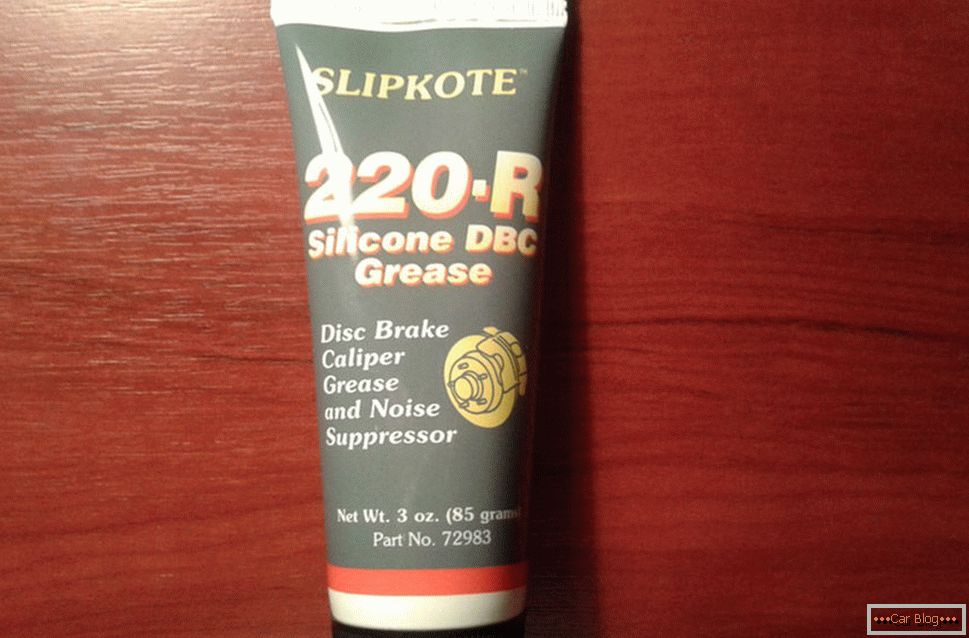
Pasta Permatex принадлежит к разряду лучших материалов, предназначенных для смазывания тормозных узлов, работающих в экстремальных и сверхагрессивных условиях. Паста не вступает в реакцию с резиновыми материалами, предотвращает заедание и скрип узлов тормозной системы. Согласно исследованиям и отзывам, этот продукт превалирует по техническим характеристикам, в сравнении с другими товарами этой категории. Работает при температурах от сорока градусов мороза до двухсот пяти тепла. Из минусов этой продукции можно выделить только её стоимость, которая варьируется в пределах ста рублей за пятиграммовый пакетик.
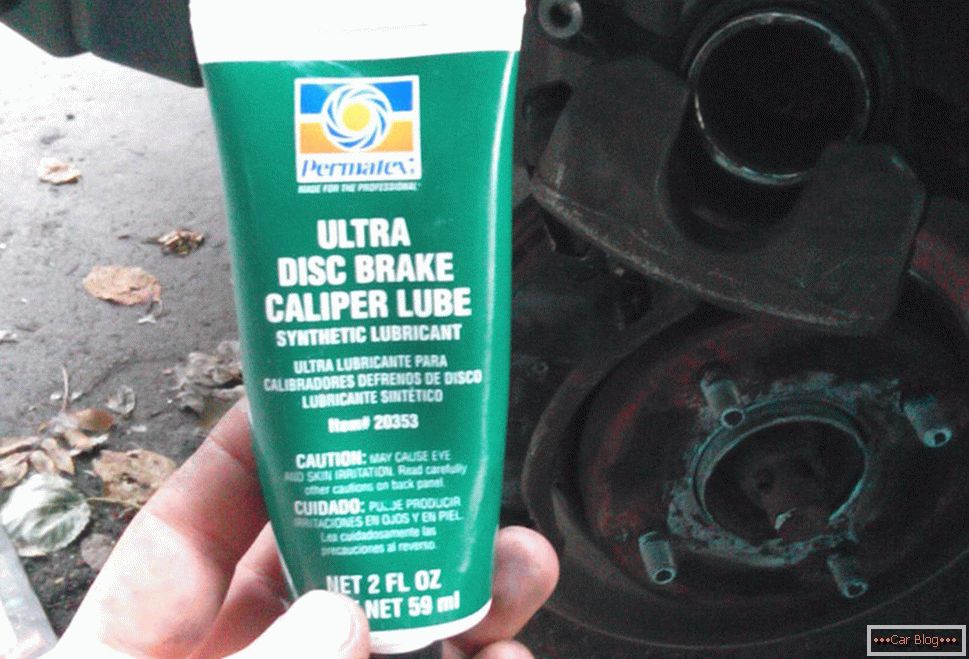
For some car owners who have previously encountered the problem of selecting a lubricant for calipers, it is a strange fact that Liqui Moly paste was not included in the rating list. Attitudes towards Liqui Moly greases are twofold among consumers: some note its high-quality characteristics, however, others, including researchers, indicate that this product is not intended for lubricating slide calipers. Official manufacturers are positioning Paste Likvi Moli today as an antiskripnuyu products, because use it for guide calipers is not recommended by either manufacturers or professionals.
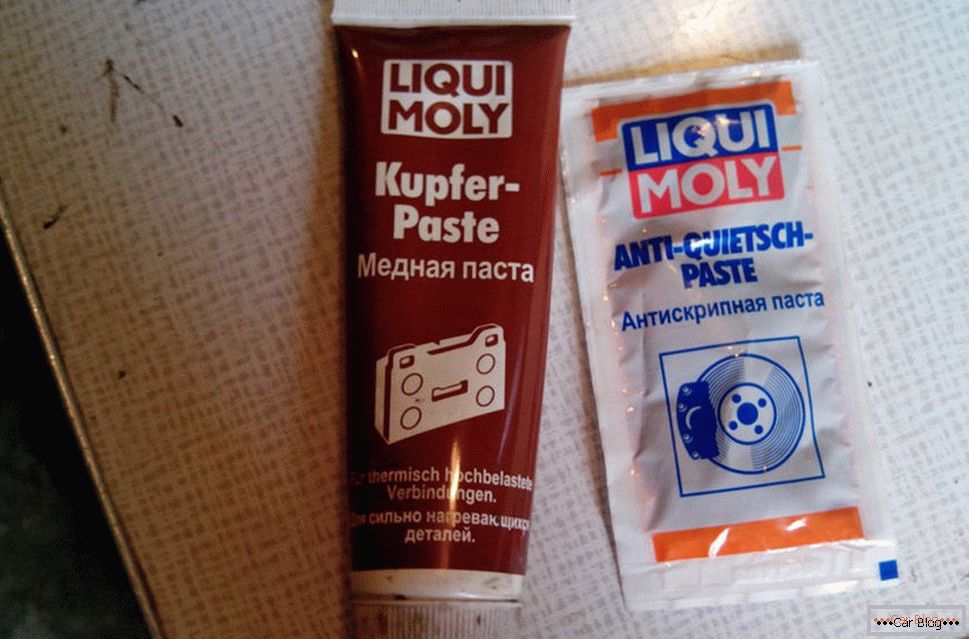
Let's sum up
Lubrication of calipers and guides - this is a mandatory procedure that must be carried out regularly by the car owner in order to prevent each intervention in the brake system of the vehicle. Failure to comply with this rule can result in serious problems in the form of uneven pad wear, rust, or a complete failure of the brakes, which is life threatening. For the brake system to work properly and correctly, it requires regular maintenance, one of the areas of which is to lubricate the calipers and guides, while it is worth using only lubricants designed for this purpose, not to save on their quality.

